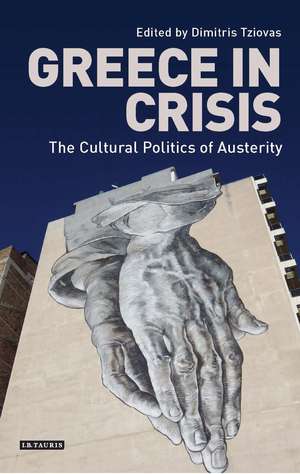Greece in Crisis: The Cultural Politics of Austerity
Editat de Dimitris Tziovasen Limba Engleză Hardback – 13 aug 2017
| Toate formatele și edițiile | Preț | Express |
|---|---|---|
| Paperback (1) | 231.69 lei 6-8 săpt. | |
| Bloomsbury Publishing – 25 dec 2019 | 231.69 lei 6-8 săpt. | |
| Hardback (1) | 715.73 lei 6-8 săpt. | |
| Bloomsbury Publishing – 13 aug 2017 | 715.73 lei 6-8 săpt. |
Preț: 715.73 lei
Preț vechi: 1028.38 lei
-30% Nou
Puncte Express: 1074
Preț estimativ în valută:
136.96€ • 146.45$ • 114.19£
136.96€ • 146.45$ • 114.19£
Carte tipărită la comandă
Livrare economică 17 aprilie-01 mai
Preluare comenzi: 021 569.72.76
Specificații
ISBN-13: 9781784538453
ISBN-10: 1784538450
Pagini: 336
Ilustrații: 15 bw integrated
Dimensiuni: 138 x 216 x 31 mm
Greutate: 0.54 kg
Editura: Bloomsbury Publishing
Colecția I.B.Tauris
Locul publicării:London, United Kingdom
ISBN-10: 1784538450
Pagini: 336
Ilustrații: 15 bw integrated
Dimensiuni: 138 x 216 x 31 mm
Greutate: 0.54 kg
Editura: Bloomsbury Publishing
Colecția I.B.Tauris
Locul publicării:London, United Kingdom
Notă biografică
Dimitris Tziovas is Professor of Modern Greek Studies at the University of Birmingham. He has served as Director of the Centre for Byzantine, Ottoman and Modern Greek Studies at the University of Birmingham and as Secretary of the European Association of Modern Greek Studies. He is the author of The Other Self: Selfhood and Society in Modern Greek Fiction and editor of Re-imagining the Past: Greek Antiquity and Modern Greek Culture.
Cuprins
List of Illustrations, Tables and ChartsNotes on Contributors Introduction by Dimitris TziovasPart I. Crisis Narratives and Cultural Politics 1.Narratives of the Greek crisis and the politics of the past by Dimitris Tziovas 2.Amphipolitics: archaeological performance and governmentality in Greece under the crisis by Dimitris PlantzosPart II. Crisis Brain Drain and Diaspora3. Crisis brain drain: short-term pain/long-term gain? By Lois Labrianidis & Manolis Pratsinakis4. Citizenship and entrepreneurship: Greek America as diaspora at a time of crisis by Yiorgos Anagnostou Part III. Cultural Economies and Institutions5. The economy and ecology of Greek cinema since the crisis: production, circulation, reception by Lydia Papadimitriou 6.Greek museums in times of crisis by Andromache Gazi 7.Feasts in time of 'plague': festivals of western classical music in Greece during the crisis by Katerina Levidou PART IV. Street Art and Nostalgia8.Visual encounters with crisis and austerity: reflections on the cultural politics of street art in contemporary Athens by Julia Tulke 9.Nostalgic visions of the Greek countryside in times of crisis: national idyll, personal fulfilment or rescuing the ecosystem by Trine Stauning WillertPART V. Literature and the Discourses of Crisis10. Undoing his/story: on fathers, domesticity and agency in Petros Markaris' Crisis Trilogy by Patricia Felisa Barbeito 11. The unbearable lightness of crisis: (anti-)utopia and middle voice in Sotiris Dimitriou's Close to the Belly by Maria Boletsi 12. Discourses and counter-discourses of the Greek crisis: a critical linguistic perspective by Dionysis Goutsos and Ourania HatzidakiBibliographyIndex
